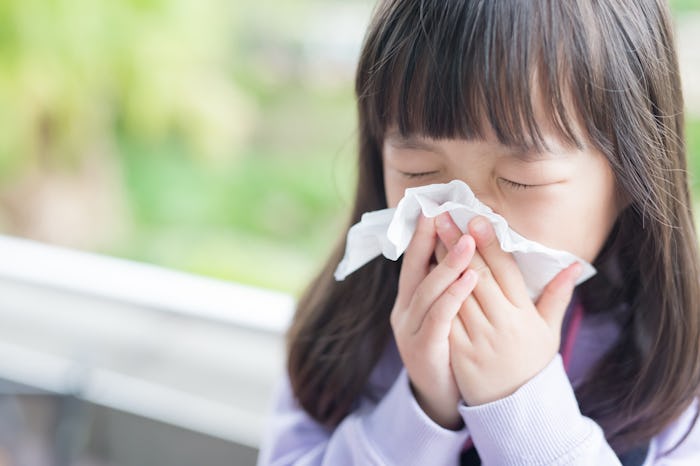Life

7 Signs Your Kid Has Indoor Allergies
Spring is in the air, which means, at least in my family, listening to a chorus of sniffling, sneezing, and coughing. I originally assumed the pollen covering my front porch was to blame, but when I asked my kids' doctor about that sniffling, sneezing, and coughing, I was surprised to learn that the pollen is an unlikely culprit. Turns out, there are signs a kid has indoor allergies, and my kids are showcasing every single one of them.
While most of us associate allergies with the pollen that blows around each spring, or the mold that lurks in piles of leaves each fall, according to the American College of Allergy, Asthma, and Immunology (ACAAI), many allergy triggers — dust mites, animal dander, mold, household cleaners, smoke — actually lurk inside your house, and can cause year-round symptoms. BabyCenter reports that common signs of indoor allergies are chronic stuffy noses and ear infections that don't seem to get better with the changing season. And unfortunately for pet lovers, the American Academy of Allergy, Asthma, and Immunology (AAAAI) warns that you can't even assume that so-called "hypoallergenic pets" are immune from causing your child to sneeze or sniffle. Other signs of indoor allergies, per the ACAAI, include rashes, like hives and eczema, and even snoring.
The good news is that if your kid has indoor allergies, there are things you can do to make your home less triggering, and treatments like antihistamines and immunotherapy that can help give them short- and long-term relief. For more on what symptoms you can look for, read on:
They Have Allergy Symptoms Year-Round
According to the AAAAI, if your child has allergy symptoms —like sneezing, itchy eyes and mouth, or a stuffy nose — they just might have allergies. And if those symptoms seem to happen all year round, the root cause is likely something that lurks inside your house.
The biggest culprit, according to BabyCenter, is dust mites — tiny creatures that live on your skin and shed onto your bedding. Before you submit to the urge to set your house on fire, you should know that dust mites themselves are harmless, and dust mite allergies can be helped by regularly washing bedding, using pillow cases, and vacuuming carpet and upholstery.
They Get Ear Infections All The Time
The ACAAI notes that indoor allergies might actually be the culprit behind your kid's frequent ear infections. This happens when inflammation and congestion from allergic reactions prevents their ears from draining like they should, trapping bacteria in the inner ear. Fortunately, if this is the case for your kid, treating their allergies should also help prevent future ear infections.
They Have Sensitive Skin
As the AAP notes, there is a clear connection between skin rashes and allergies. For instance, kids with eczema as babies and toddlers are way more likely to develop allergies and asthma later on in life. Itchy rashes can also be a sign of a contact or pet allergy, too. Detergents, soap, pet dander, and household cleaners can all cause allergic skin reactions in your kid, so it may take a bit of trial and error to figure out the culprit.
They Get Worse Around Animals
Per the AAAAI, there are no completely hypoallergenic pets. This is because people with pet allergies are allergic to dander, skin, saliva, and urine, too. So, if your kids' symptoms get worse when they sleep near or hang out with your pet, they just might be causing the problem.
They Snore
The ACAAI notes that indoor allergies often cause chronic sinus conditions, like stuffy noses, frequent infections, and snoring. Because they can't breath through their noses easily at night, this can lead to disrupted sleep for your kiddo.
Their Symptoms Get Better In The Summertime
One surefire way to know if your kids' allergy symptoms are caused by something in your house, is to see if they actually get better in the summer time and when your kid spends more time outside. According to BabyCenter, another test is to see if their allergy symptoms improve on vacation (e.g. when away from their pet), or after you clean your carpets or replace furnace filters.
They Constantly Have A Runny Nose
If, like me, your toddler seems to always have a runny nose, you might assume that it's just a cold. However, as BabyCenter reports, while the symptoms of a cold and allergies are similar, colds eventually go away in a week or two, while allergy symptoms will continue, especially if they are caused by something inside your house.
According to the AAP, you shouldn't attempt to treat your child's allergies without first asking their doctor about safe treatment options. If you think your child might have allergies, you can ask their doctor for advice or visit the AAAAI to find an Allergist/Immunologist near you.
This article was originally published on